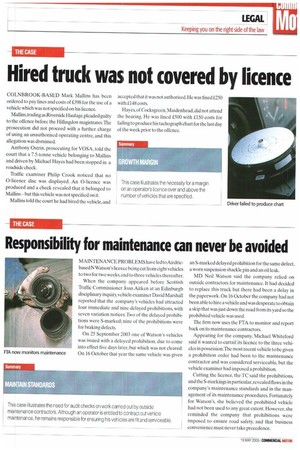Responsibility for maintenance can never be avoided
Page 37

If you've noticed an error in this article please click here to report it so we can fix it.
MAINTENANCE PROBLEMS have led to Airdriebased N Watson's licence being cut from eight vehicles to two for two weeks, and to three vehicles thereafter.
When the company appeared before Scottish Traffic Commissioner Joan Aitken at an Edinburgh disciplinary inquiry, vehicle examiner David Marshall reported that the company's vehicles had attracted four immediate and nine delayed prohibitions, with seven variation notices. Two of the delayed prohibitions were S-marked; nine of the prohibitions were for braking defects.
On 25 September 2003 one of Watson's vehicles was issued with a delayed prohibition, due to come into effect five days later, but which was not cleared. On 16 October that year the same vehicle was given an S-marked delayed prohibition for the same defect, a worn suspension shackle pin and an oil leak.
MD Neil Watson said the company relied on outside contractors for maintenance. It had decided to replace this truck but there had been a delay in the paperwork. On 16 October the company had not been able to hire a vehicle and was desperate to obtain a skip that was just down the road from its yard so the prohibited vehicle was used.
The firm now uses the FTA to monitor and report back on its maintenance contractors.
Appearing for the company, Michael Whiteford said it wanted to curtail its licence to the three vehicles in possession.The most recent vehicle to be given a prohibition order had been to the maintenance contractor and was considered serviceable, but the vehicle examiner had imposed a prohibition.
Cutting the licence, the TC said the prohibitions, and the S-markings in particular, revealed flaws in the company's maintenance standards and in the management of its maintenance procedures. Fortunately for Watson's, she believed the prohibited vehicle had not been used to any great extent. However, she reminded the company that prohibitions were imposed to ensure road safety, and that business convenience must never take precedence.














































































































































































































